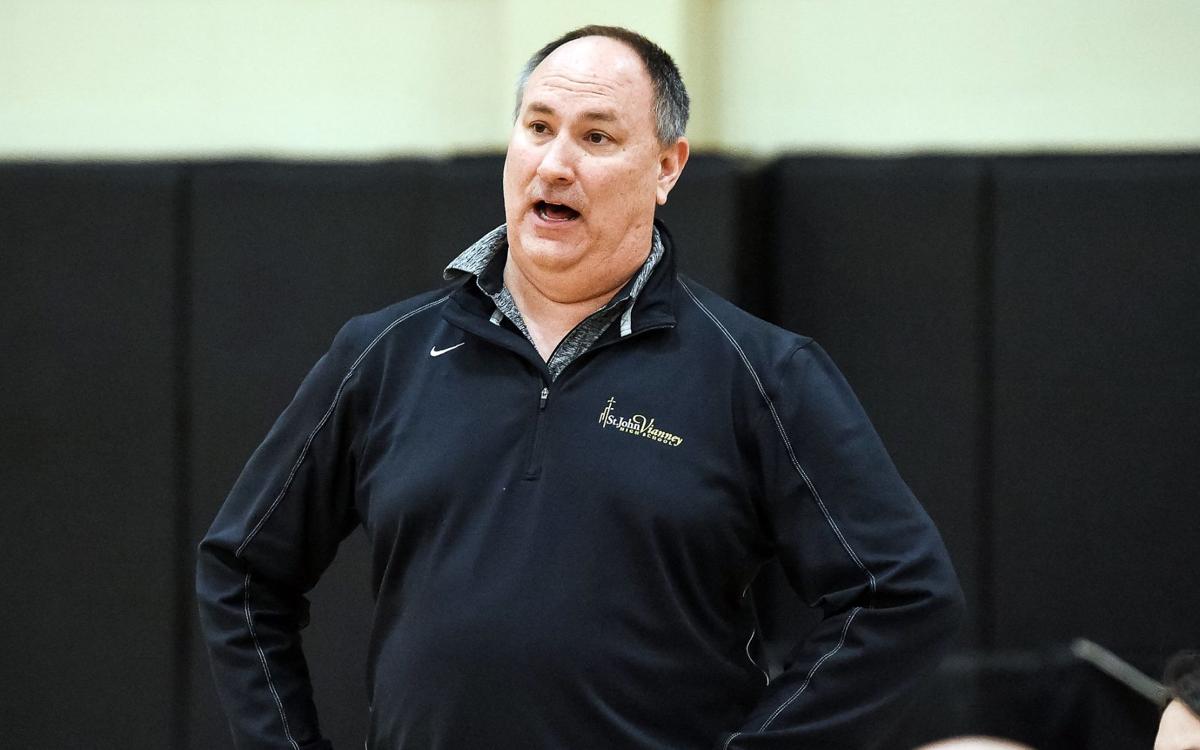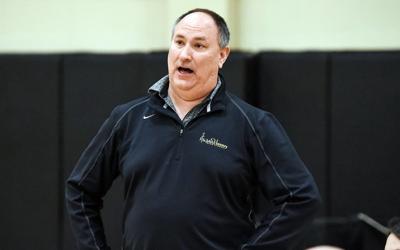For someone who technically hasn’t won a single high school boys volleyball match, Jeff Gabbert has made a lasting impact on the sport in Missouri.
Of course, that 0-0 record is a technicality as the Missouri State High School Activities Association finally recognized boys volleyball as an official sport this season. MSHSAA’s official records start this season, meaning anything before when boys volleyball was a club sport will not be included in the state’s governing body’s record book.
But without Gabbert, who retired after last season to end a 35-year tenure as Vianney’s coach, the sport is probably nowhere near being an official MSHSAA sport.
“Jeff created a movement,” said Eureka coach Bryan Pieschel, who played for and was an assistant coach under Gabbert. “Wayne Pounds being the father kind of, you know, boys volleyball in St. Louis. Gabbs took that to a completely different level. ... He transformed boys volleyball in St. Louis.”
People are also reading…
Vianney won a record 16 state championships in the pre-MSHSAA era. Gabbert, a 2018 inductee into the Missouri High School Volleyball Coaches Association Hall of Fame, won more than 800 matches and guided the Golden Griffins to 25 final fours.
The coaching tree Gabbert has left behind is equally as impressive as the win total.
Pieschel played for and was an assistant under Gabbert as was his younger brother, Jeff, who is an assistant at St. Louis U. High. Jeff Cheak, the SLUH coach, is also part of that tree as are De Smet coach Tim Haffner, Vianney coach Jillian Hoge, Vianney assistant Tommy Vander Pluym, former CBC coach Matt Kuetzer, former Olympian and Long Beach State assistant Scott Touzinsky, former Kirkwood coach Keith Touzinsky, High Performance club director Scott Mebruer and Missouri Baptist coach John Yehling.
That’s not counting the numerous club and college assistants who have spread out from St. Louis.
“It's the thing that I'm most proud of in my whole career by far, the championships included, is giving people a love for the game and that they want to carry it forward into being coaches themselves,” Gabbert said. “That’s the most rewarding thing.”
Cheak, who has won seven state championships at SLUH, said he bases almost everything he does on things he learned as a player and coach under Gabbert.
“One of Gabbert's absolute best attributes is he would get the players on his team, his coaching staff, to just be as competitive, to be there for your teammates, and just absolutely love coming to the gym and he made that very contagious,” Cheak said. “That's what I still take from him.”
That love of coming to the gym every day and putting in the hard work was a trademark of Gabbert’s teams and it continues to be a trademark of teams led by his coaching tree.
Wins are always due to the players’ efforts and losses are always on the coaching staff.
“As soon as the match is over, you think about what you can do better,” Gabbert said. “How you can prepare your kids more fully for the next situation that they're going to encounter and what can we do to become better and give us a better chance to be successful?”
Hoge was an assistant under Gabbert at Vianney for 10 years and coached club with him for six seasons. Gabbert endorsed Hoge, who also coaches High Performance’s top team 18u Royal, to take over the Golden Griffins program when he announced his retirement.
“It meant a lot to me, especially because I’m sure there were some big-time alums that probably wanted to come back,” Hoge said. “He's always had my back, especially being just like a young female in a male-dominated business, which has meant a ton to me.”
Gabbert is Hoge’s biggest fan. He still makes as many Vianney matches as he can but does not miss the daily grind.
However, being a fan has come with unintended consequences.
“It's more stressful by a lot,” Gabbert said. “I didn't see that coming. When I was coaching and you're in those battles with the guys, you and the boys have complete control of what's going on. But in the stands, you have no control. And, you know, I've always heard this from the parents all over the years and I never really understood it. Well, now I do.”
Haffner played for Gabbert and was an assistant under him for eight years. He has gone on to guide both De Smet to a boys state championship and Cor Jesu to a girls state championship.
“It's a lot of a lot of building that culture, a lot of communication with the players, building relationships, all of those things I've learned from him,” Haffner said.
Pieschel said he is not surprised by the widespread success that Gabbert’s former assistants have had with their own programs.
“All that guy's done is helped produce winners and winners because of their work ethic,” Pieschel said. “Obviously great players come along, they come and go, right, but the consistency at this level all comes from your approach year in and year out, day in and day out.”
Cheak said Gabbert is an expert communicator. He isn’t afraid to have tough conversations with his players. That honesty tends to bring out the best in both players and coaches.
It also forms a bond that tends to stretch well beyond the volleyball court.
“He's not in the gym just to win,” Cheak said. “He is in the gym for those relationships and to be there for you. He just absolutely loves being in the gym with the players and the coaches and as a result you build that bond.”
Cheak said Gabbert is a driving force in getting boys volleyball officially recognized by MSHSAA. He said Gabbert’s ability to get boys to love the sport helped it explode in the St. Louis area and to points beyond.
Ironically, MSHSAA won’t recognize Gabbert’s impressive number of wins and titles at Vianney even though he is a big reason the sport has grown into what it is now.
But that’s OK with Gabbert. It’s never truly been about wins and losses to him.
“The explosion in popularity is so satisfying,” Gabbert said. “It's just great to see, you know, how many boys are out there getting exposed to the sport and hopefully get hooked on it.”








